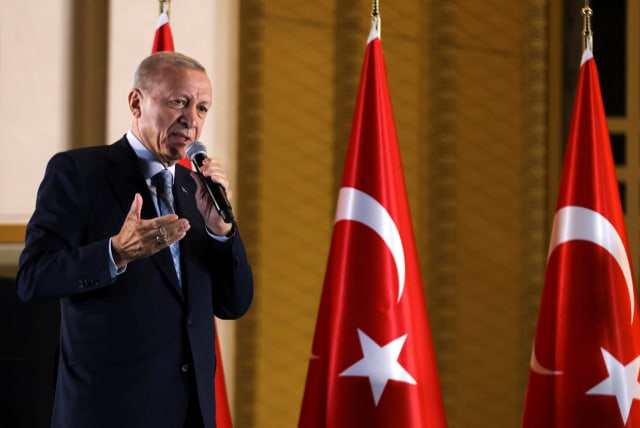Turkey’s Erdogan in historic three-country Gulf trip - analysis

Ankara’s diplomatic offensive is part of a wider diplomatic era in the region in which the Syrian regime is returning to the Arab League and Iran is doing more outreach.
Turkey’s President Recep Tayyip Erdogan was in Saudi Arabia on Monday as part of a larger tour of the Middle East.
Turkey’s leader is riding high after winning elections earlier this year and he is trying to repair Turkey’s ties in the region and also seeking to boost Ankara’s economy.
Turkey faces many challenges. Ankara has tried to position itself between the West and the Ukraine crisis and an independent policy with Russia, Iran, and the rest of the world. The issue for Ankara is that playing both sides hasn’t always worked. It used to back the Muslim Brotherhood in the region, but it now is trying to rekindle ties with countries like Saudi Arabia.
What is the context behind Turkey's diplomatic offensive?
Ankara’s diplomatic offensive is part of a wider diplomatic era in the region in which the Syrian regime is returning to the Arab League and Iran is doing more outreach. Iraq’s prime minister, for instance, was just in Syria.
According to reports at Arab News, Erdogan “is leading a massive delegation of government ministers and officials, and about 200 business leaders, investors and company owners.” He met with Crown Prince Mohammed bin Salman and met with several Saudi ministers and officials.

According to this report, the countries signed agreements “in the fields of energy, defense industries, research and development, direct investment, media, as well as two contracts with Turkish company Baykar.”
Turkey wants investment and it wants to make inroads for its leading companies, including defense companies. Ankara has been trying to sell Bayraktar drones and other drones in the region, including to Kuwait, Iraq, and other states.
According to the Arab News report, the trade with Saudi Arabia amounted to $6.5 billion last year. Ankara has a need to attract a lot of investment to help its economy. In the past, its claims that it has received investment have generally not met expectations.
The Gulf is also well known for having deep pockets but not all the spending comes through. For instance, Saudi Arabia was supposed to be spending $110 billion on arms deals in 2018 during the Trump administration. Now the reports say that Turkey has sent contractors for discussions with Aramco for deals that could be worth $50 billion, the Arab News story said.
Al-Ain media focused on the Turkish-Saudi meetings as well. It focused on possible defense procurement.
Turkey’s state media says that Erdogan will travel to Qatar and UAE next. Turkey’s state media sees this as part of a new global order.
TRT says “it marks a new phase in Ankara’s relations with energy-rich Saudi Arabia, Qatar, and the United Arab Emirates (UAE) in a new global order. This is Erdogan’s first official visit to the region since his re-election as President in May, cementing his position as one of Turkiye’s most influential leaders ever.”
Ankara sees this as a “win-win” strategy. This follows how Ankara usually conducts foreign policy by creating a crisis and then solving the crisis. It did this with NATO and also declared victory. It did this with the US and also claims victory. Now it claims victory in the Gulf.
It’s not clear if all these “wins” pan out though. This big question will be to see if the defense deals and other deals actually lead to a real blossoming or just a lot of plowing of fields and not a lot of reaping.
